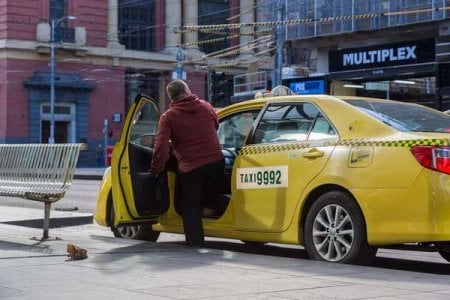Victorian government announces suite of changes to stamp out dodgy taxi drivers
By
ABC News
- Replies 4
Victoria's taxi and rideshare companies will undergo a suite of changes in a bid to crack down on dodgy drivers and stamp out bad behaviour.
On Friday the state government announced a package of reforms which would include increasing the penalties for bad behaviour, mandating audio recordings and a new "two-strike rule".
"Our commercial passenger vehicle (CPV) industry is incredibly important for our city and state," transport minister Gabrielle Williams said.
"Which is why it's so important that we ensure that it is as safe as it can possibly be and as reliable as it can possibly be."
The new two-strike rule would be similar to what exists in New South Wales, allowing the regulator to cancel the accreditation of a driver who has two fare-related convictions.
In addition to that, drivers might also have their accreditation cancelled or suspended if there is a pattern of complaints made against them, including for things like not using a meter.
"There might be complaints made about an individual driver that are very similar but fall below that conviction threshold, it still allows the regulator to do something about it," Ms Williams said.
The news was welcomed by Victorian Taxi Association director Peter Valentine, who said it was something the organisation had wanted for a long time.
“We don't want ... those type of drivers in the state. It's not good for the state and it's not good for the industry," he said.
He questioned whether it would be enforced properly, but said that was the responsibility of the government.
“We want to make sure that they do enforce it and that [drivers are made] fully aware ... that it's not something that they can take on lightly," he said.
Mandatory recordings don't go far enough, peak body says
The announcement followed media reports in The Age which detailed how a taxi driver abused and scammed a number of passenger with disabilities.
Some incidents were captured on CCTV and ultimately led to the driver's conviction.
"We saw some reporting earlier this year which quite frankly put on display some utterly unacceptable and disgusting behaviour by a small number, and we do know it's a minority cohort, of drivers in our CPV industry," Ms Williams said.
"That conduct that was reported is quite clearly unacceptable to all Victorians."
Under the changes, camera rules will be updated to give carers access to live, in-vehicle camera vision, if it is offered by the taxi or rideshare company.
It will also be mandatory for cameras in booked vehicles to record the audio and vision of those rides.
The government said it would assist in building evidence when a complaint was made and would also allow companies to act swiftly.
But Mr Valentine said whilst it was a good start, it needed to expand beyond booked taxis.
"We’ve seen incidents in North Melbourne of rape out of rideshare cars," he said.
"It cannot stop at taxis. It has to be in all commercial passenger vehicles, and that means it must also be in your rideshare car."
It has become easier for passengers to make a complaint with the rollout of QR codes, which link passengers directly to a complaints page, earlier this year.
The page also provides passengers with information about unlawful conduct.
The government said these changes were just the start of measures to be rolled out.
Ms Williams said the government was also keen to expand the retention time of footage in vehicles. Recordings are currently kept for 72 hours.
She said camera settings would be reviewed to better understand technological constraints before making any changes there.
On Friday the state government announced a package of reforms which would include increasing the penalties for bad behaviour, mandating audio recordings and a new "two-strike rule".
"Our commercial passenger vehicle (CPV) industry is incredibly important for our city and state," transport minister Gabrielle Williams said.
"Which is why it's so important that we ensure that it is as safe as it can possibly be and as reliable as it can possibly be."
The new two-strike rule would be similar to what exists in New South Wales, allowing the regulator to cancel the accreditation of a driver who has two fare-related convictions.
In addition to that, drivers might also have their accreditation cancelled or suspended if there is a pattern of complaints made against them, including for things like not using a meter.
"There might be complaints made about an individual driver that are very similar but fall below that conviction threshold, it still allows the regulator to do something about it," Ms Williams said.
The news was welcomed by Victorian Taxi Association director Peter Valentine, who said it was something the organisation had wanted for a long time.
“We don't want ... those type of drivers in the state. It's not good for the state and it's not good for the industry," he said.
He questioned whether it would be enforced properly, but said that was the responsibility of the government.
“We want to make sure that they do enforce it and that [drivers are made] fully aware ... that it's not something that they can take on lightly," he said.
Mandatory recordings don't go far enough, peak body says
The announcement followed media reports in The Age which detailed how a taxi driver abused and scammed a number of passenger with disabilities.
Some incidents were captured on CCTV and ultimately led to the driver's conviction.
"We saw some reporting earlier this year which quite frankly put on display some utterly unacceptable and disgusting behaviour by a small number, and we do know it's a minority cohort, of drivers in our CPV industry," Ms Williams said.
"That conduct that was reported is quite clearly unacceptable to all Victorians."
Under the changes, camera rules will be updated to give carers access to live, in-vehicle camera vision, if it is offered by the taxi or rideshare company.
It will also be mandatory for cameras in booked vehicles to record the audio and vision of those rides.
The government said it would assist in building evidence when a complaint was made and would also allow companies to act swiftly.
But Mr Valentine said whilst it was a good start, it needed to expand beyond booked taxis.
"We’ve seen incidents in North Melbourne of rape out of rideshare cars," he said.
"It cannot stop at taxis. It has to be in all commercial passenger vehicles, and that means it must also be in your rideshare car."
It has become easier for passengers to make a complaint with the rollout of QR codes, which link passengers directly to a complaints page, earlier this year.
The page also provides passengers with information about unlawful conduct.
The government said these changes were just the start of measures to be rolled out.
Ms Williams said the government was also keen to expand the retention time of footage in vehicles. Recordings are currently kept for 72 hours.
She said camera settings would be reviewed to better understand technological constraints before making any changes there.
Last edited by a moderator:









